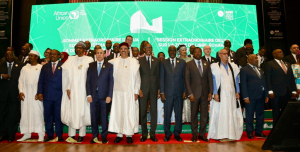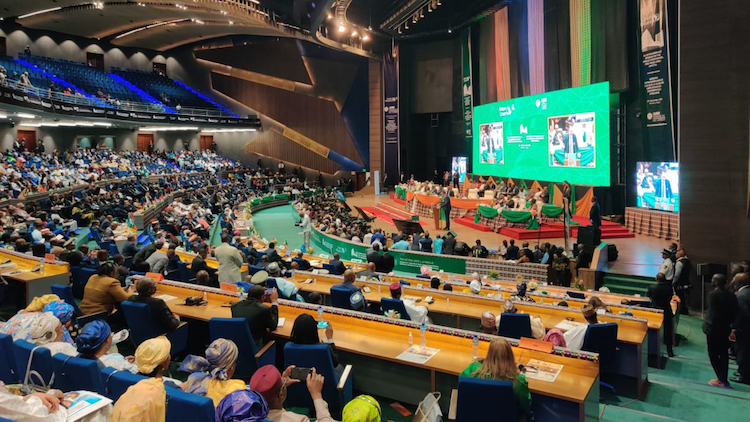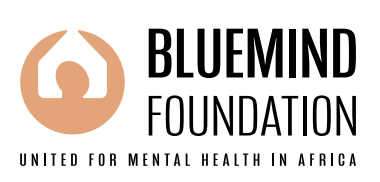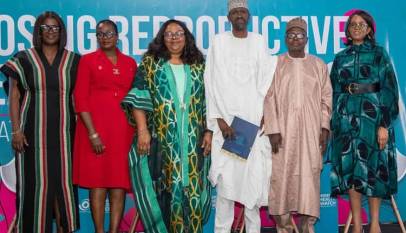When industrialization became a centrepiece of Africa’s agenda
The African Union Summit on Industrialization, Economic Diversification cum Extraordinary Session on the African Continental Free Trade Area (AfCFTA) held November 25 in Niamey, Niger.

The 1980s First Industrial Decade for Africa (IDDA1) marked the beginning of a conscious policy effort to make Africa’s industrialization a priority. Subsequently, 1991-2000 was declared the Second Industrial Development Decade for Africa (IDDAII), followed by 2016-2025 as the Third Industrial Development Decade for Africa (IDDA III). In 2008, the African Union Assembly adopted the Plan of Action for the Accelerated Industrial Development of Africa (AIDA).
Despite this array of policies aimed at boosting Africa’s industrialization, not much progress has been recorded in industrializing the continent, which demands absolute commitment of African leaders towards sustainable industrialization as a cardinal pillar of the AU’s Agenda 2063. This requires a reinvigorated industrialisation framework built on the lessons of previous initiatives and taking into account Africa’s current and emerging socioeconomic and political realities.
To this end, Africa must realise that achieving industrialization is not a standalone process, rather a multisectoral and multi-dimensional one, which necessitates addressing interconnected structural and economic growth bottlenecks and fragilities, such as energy and road infrastructure, financing, human capital, agro-industrial transformation, green industrialisation, technological innovation as well as trade facilitation.
It was in recognition of the strategic and mutually reinforcing linkages between industrialisation and the African Continental Free Trade Area (AfCFTA) Agreement, that the 33rd Ordinary Session of the Assembly of Heads of State and Government of the AU held February 2020, mandated the AU Commission and partners to organize a summit on industrialization and economic diversification, and later, an extraordinary session on the AfCFTA.
Subsequently, Heads of State and Government of the AU gathered in Niamey, Niger (November 25) for the Summit aimed at rallying desired political momentum, resources, partnerships and alliances towards industrializing Africa. This was an unambiguous demonstration of African leaders’ renewed high-level political commitment towards sustainable industrialization and trade as well as their resolve to leverage Africa’s rich and diverse natural resources and competitive advantages to drive structural transformation.
The Summit was part of activities to commemorate the 2022 Africa Industrialisation Week (AIW), which kicked-off with a session commemorating the Africa Industrialization Day (November 20), followed by weeklong in-person and virtual sessions including an ordinary session of the AU Executive (Ministerial) Council (November 23), climaxing with the Extraordinary Summit of the AU Heads of State and Government on Industrialization and Economic Diversification cum Extraordinary Session on the AfCFTA (November 25).
Previous industrial policies produced insignificant results – Faki
In his opening statement, Moussa Faki Mahamat, Chairperson of the AU Commission, said the Summit was a manifestation of the proclamation of IDDA1, IDDAII and IDDAIII as well as AIDA, acknowledging the fact that these industrialization policies which were developed over the previous decades had not produced significant results, hence the need “to transcend ourselves in our efforts to improve our results.”
“The forward-looking eye that we are about to cast on the process of industrialisation of our Continent should, therefore, be nurtured by questioning the past and identifying factors that have weighed down Africa in its march towards industrialisation, on the one hand, followed by the identification of the major trends, ruptures and seeds of change which are in the process of shaping the future of the world economy, on the other hand,” cautioned the AU chief.
Mr Mahamat said the future global economic order will be influenced by, among others, population growth, technological advancement, climate change, access to energy, as well as security challenges shaped by terrorism and food insecurity. “It is within this framework that we should, today, rethink Africa’s industrialisation model. The decisive challenge, in the choice to industrialise, lies in the objective consideration of all of our potentials.”
The AU Chief expressed his Commission’s gratitude to former Nigerien President Mahamadou Issoufou, in his capacity as Champion of the AfCFTA, whose commitment, dedication and proven know-how, he said, largely contributed to bringing the AfCFTA Agreement out of limbo to its present operational state.
Africa’s industrialization requires AfCFTA’s implementation – President Bazoum
In his welcome remarks, President Mohamed Bazoum of Niger, said the Summit demonstrates the commitment of the AU’s leadership at the highest level to accelerate industrialization as a means to achieve Agenda 2063 and Agenda 2030, through the implementation of crucial strategies, involving all stakeholders including public and private actors.
Like Mr Mahamat, President Bazoum also paid tribute to his predecessor, President Issoufou Mahamadou, whose unwavering commitment he said made the AfCFTA a reality.
“Industrialization is synonymous with trade, as their dynamics are coupled. Therefore, Africa’s industrialization requires the implementation of the AfCFTA Agreement, which is premised on industrialization. What is good for one is good for the other and vice versa; what is bad for one is bad for the other. Thus, the promotion of both must take into account this positive dependence necessary to achieve economic development,” he underscored.
President Bazoum said even as there was currently a multiplicity of efforts to boost Africa’s industrialisation which had inspired a new sense of optimism, optimism shouldn’t preclude realism. Hence, the Nigerien President said for Africa to have every chance of success, “we must tell each other the truth. With regard to the current state of industrialization in the current state of industrialization in Africa.
“With a few exceptions, the African economy remains un-industrialized, Africa exports raw materials to import value-added goods. This observation at the continental level also remains valid at the level of each of our states. Two figures bear eloquent witness to this state of affairs: Africa’s share of world trade is 4% while trade between African countries represents 17% of their global trade. Africa’s low level of industrialization explains this depressing state of affairs.”
In the quest to industrialize Africa, President Bazoum said Niger’s highest priority remains the livestock sector. “Do you know that in my country, Niger, which has one of the largest herds in Africa, we import milk from France and Holland? That our immediate neighbors import meat from Argentina and New Zealand? These facts, astonishing as they are, are a false paradox. This economy, on the principle of communicating vessels, generates little local employment and harms local production.”
Reforming OECD’s access to export credit conditions necessary – President Sall
In his opening remarks, President Macky Sall of Senegal, cum incumbent Chairperson of the AU (represented), said, with now barely three years before the end of IDDA3, Africa needed to break the vicious circle of unequal exchange with developed nations that had reduced the continent to a reservoir of low-value raw material export.
“There is an urgent need to improve our production tools, including energy, digital, logistics and transport infrastructures to support the productivity of our industries. There is an urgent need to ensure the employability of our young people by further developing technical and vocational training, so that, from the welder to the design engineer, our countries can have the human capital to support the structural transformation of industry at all levels: from the small SME-SMI to the large production unit.”
However, President Sall noted that achieving industrialization and structural transformation of African economies remains dependent on global governance, hence the continent’s development efforts will be in vain as long as the international economic and financial system continues to keep African countries in a state that hinders investment flows, noting that African leaders have a responsibility to make the right decisions at the domestic and inter-African levels.
To this end, President Sall called for the reform of the OECD’s conditions of access to export credit, by relaxing rules on credit rates and duration of grace periods and repayment periods, to allow for the mobilization of more resources for the financing of development projects, including through public-private partnerships. He also called for a collective front against abusive tax vacations, tax evasion and tax optimization, which deprive African countries of important financial resources.
“In the same spirit, I call for a massive adherence by our countries to the BEPS Multilateral Convention for the implementation of tax treaty measures to prevent tax base erosion and profit shifting. [I also call for] the fight against the exaggerated perception of risk that increases insurance premiums and the cost of investment on the continent. Recent studies have shown how ratings by rating agencies are biased by criteria unrelated to economics, such as language and cultural factors,” urged President Sall.
The AU chair further called for a “fair and equitable” energy transition that allows African countries achieve universal access to electricity, particularly because more than 600 million Africans lacked access to electricity and also decried the fact that African countries were resorting to debt to finance climate adaptation projects, due to the failure of rich countries – who are also major polluters – to support their adaptation efforts.
Likewise, President Sall urged AU Member States to key into the AfCFTA Guided Trade Initiative, by removing tariff and non-tariff barriers to trade to allow the private sector benefit from the Agreement. “On the other hand, as we implement our policies, it is essential to continue building basic transport and logistics infrastructure. Trade and integration will remain wishful thinking if we remain isolated from each other, and if to travel within the continent we are sometimes forced to transit through the outside world.”
We must turn AfCFTA into an industrial zone – Dr Adesina
While addressing the Summit, Dr Akinwumi Adesina, President of the African Development Bank (AfDB) Group, described AfCFTA as Africa’s “best pathway to prosperity” and identified agriculture as the sector with the greatest potential for industrializing Africa, which is home to 65% of the world’s uncultivated arable land. To this end, Dr Adesina said the AfDB and AU Commission were organizing a Presidential Feed Africa Summit come January 2023 to develop action plans to fully transform Africa’s agriculture.
“The AfCFTA is the continent’s best pathway to prosperity. To unlock its potential, however, we must not just trade. We must turn the zone into an industrial manufacturing zone. Free Trade Zones that launch prosperity around the world have done so not by trading low-value commodities, but by industrial manufacturing. Without any doubt, Africa’s wealth must no longer depend on exports of raw materials but of finished value-added products. The door to poverty is through export of raw materials, the highway to wealth is industrialization,” he stressed.
In this direction, the AfDB chief said Africa must begin to turn its cocoa beans into chocolates, cotton into textile and garments, and coffee beans into brewed coffee, towards the realization of which, he said, his Bank was investing $25 billion in agriculture and another $1 billion in the development of Special Agro-Industrial Processing Zones (SAPZs) across 18 countries, to unlock Africa’s potential in food and agriculture.
“Africa has an abundance of natural resources, oil, gas, minerals, and metals, as well as an extensive blue economy that must be rapidly industrialized. The future of electric cars in the world depends on Africa, given its extensive resource deposits in rare minerals, especially lithium-ion, cobalt, nickel, and copper. The size of the electric vehicles market has been estimated to reach $7 trillion by 2030 and $46 trillion by 2050. Building precursor facilities for lithium-ion batteries in Africa will be three times cheaper than in other parts of the world.”
Nevertheless, to industrialize, Dr Adesina said Africa must solve its perennial energy and electricity challenges, even as it is endowed with 45% of the world’s resources for renewable energy, including solar, hydro, wind, and geothermal energy sources, noting that the AfDB had invested over $7.5 billion in the past five years to expand access to electricity, providing electricity for 20 million people.
“To further boost electricity availability, the AfDB is implementing a $20 billion Desert-to-Power initiative to develop 10,000 megawatts of solar power across 11 countries in the Sahel zone of Africa, which will provide electricity for 250 million people. The program, which has already garnered massive global support and has commenced in the G5 Sahel countries, will become the world’s largest solar zone. To further boost Africa’s manufacturing capacity for green energy, the Bank will work with its partners to support the manufacturing of solar panels in Africa,” assured the AfDB chief.
Afreximbank accelerating Africa-Caribbean integration – Prof Oramah
In another statement, Prof. Benedict Oramah, President of the African Export-Import Bank (Afreximbank), said his bank, the AU Commission and the AfCFTA Secretariat had launched the commercial operations of the Pan-African Payment and Settlement System (PAPSS), to allow for intra-African trade payments in African national currencies and save Africa a minimum of $5 billion in transfer and settlement charges, while returning to the continent trades that were diverted to non-African markets due to use of third currencies to pay for intra-African trade.
In addition, Prof Oramah said his bank was helping African economies manage the exodus of international banks by financing African-owned financial institutions to acquire those banks, so as to build a strongly interconnected African financial system, adding that they had also onboarded about 500 of the continent’s 600 regulated commercial banks into the Afreximbank Trade Finance Facility (AFTRAF) and were currently providing them with trade credit confirmation lines.
“Our goal is to grant an aggregate of $8 billion in Trade Confirmation lines to these African banks and ensure that every country on our Continent has at least one bank that has a dedicated credit line to support intra-African trade. Afreximbank sits today at the center of the most extensive messaging network, with connections to almost 500 banks. We have built a web that will form the architecture for an integrated African banking network. We do these because we are convinced that Africa’s economic development prospects will be defined by the extent of control the continent wields over its financial system,” the Afreximbank chief said.
Prof Oramah said Afreximbank was working with the Africa Regional Standards Organisation (ARSO) to harmonise standards for major tradeable goods in Africa, covering the automotive industry, pharmaceuticals, medical devices and textiles. To provide the infrastructure to implement the harmonized standards, he said Afreximbank was setting-up the African Quality Assurance Centers (AQACs), a state-of-the-art facility with the capacity to offer testing, certification, inspection, and training services in Nigeria, Tanzania, Egypt and Cameroon.
Moreover, the Afreximbank chief said because the auto industry presents a good opportunity for building regional value chains and driving industrialisation, the Bank was as well collaborating with the African Association of Automotive Manufacturers (AAAM), towards the emergence of an automotive value chain in Africa. “The Bank has supported the development of a Continental Auto Strategy and provided a grant to finance its implementation. We are also working with partners to champion the emergence of an Auto Pact between and among relevant African states with a view to fostering the emergence of a credible automotive value chain.”
Oramah told the August assembly that following the declaration of the Diaspora as Africa’s sixth region and the first-ever Africa-Caribbean Summit held in 2021, Afreximbank had taken steps to accelerate Africa-Caribbean integration by hosting the maiden Africa-Caribbean Trade and Investment Forum. Consequently, he said about 9 out of the 14 Caribbean Community (CARICOM) countries had signed an agreement to open up the region to Afreximbank interventions, to promote trade and investment flows between the two regions.
“In that regard, we have conducted successful trade and investment missions to the Caribbean with African corporates and banks to explore opportunities in that market. Plans are advanced towards opening an Afreximbank office in the Caribbean to support Africa-Caribbean trade and investments better. We are also supporting two African commercial banks that have already decided to follow the Bank and commence operations in the Caribbean. We have now moved from the phase of wishes to the stage of actions. Things will never be the same again concerning Africa-Caribbean relations,” he assured.
We need capable institutions to design, implement industrial policies – Summit partners
In a joint statement on 2022 Africa Industrialization Day (November 20), the Summit’s organising partners, namely the AU Commission, African Union Development Agency (AUDA-NEPAD), United Nations Industrial Development Organisation (UNIDO), as well as the Economic Commission for Africa, (ECA), called on African countries to set up innovative and inclusive institutions capable of designing and implementing effective industrial policies and processes, as stipulated in frameworks such as Agenda 2063, Agenda 2030 and IDDA III.
“In that context, Africa must continue to ride on the huge potential it has in various areas including in agriculture and agroprocessing. Statistics show that the continent can, if the right investments are made, become the food basket of the world given its 60% endowment in global uncultivated arable lands. To achieve this, there is need for determined commitment and implementation by African leaders and the private sector in investing massively in agricultural transformation and meeting the target of sustainably allocating 10 percent of public expenditure to agriculture as prescribed in the 2014 Malabo Declaration,” the statement read.
The joint statement further said an agric-driven industrialization in the AfCFTA era would create new and strengthen strategic regional value chains, adding that the disruption of global supply chains also opens a window of opportunity to harness strategic commodity-oriented industrialization in a climate friendly manner. “Africa has the huge potential of embracing this shift through targeted investments in commodity value chains including in the framework of the Africa Mining Vision [AMV] that sets actionable priorities for Africa’s mining sector to become a key enabler of a diversified, vibrant and globally competitive industrial African economy.”
“As we salute the efforts made so far towards Africa’s industrialization, we remain conscious of the tremendous efforts needed to unlock the potential of productive transformation in the world’s most promising continent. Therefore, we need to rethink Africa’s strategic engagements with partners to always put African priorities at the center of international negotiations. In this regard, we call upon the international community to strengthen support for Africa’s industrialization and economic transformation efforts,” the Summit partners urged.
Among others, proceedings of the Niamey summit covered the adoption of the Draft Declaration and Decision of the AU Extraordinary Summit on Industrialization and Economic Diversification. Whereas the Extraordinary Session on AfCFTA saw the presentation of the Report of the AU Champion on AfCFTA and the launch of AfCFTA’s additional operational tools (AfCFTA E-Tariff Book; AfCFTA Rules of Origin Manual; AfCFTA Guided Trade Initiative); as well as adoption of the Draft Decision of the Extraordinary Session on the AfCFTA.
















